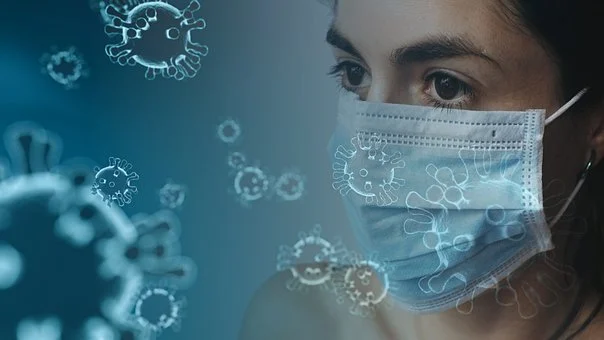Corona virus (Covid-19)
1. The coronavirus outbreak began in mid-December 2019 in Wuhan, China. Coronavirus is an infectious disease named COVID-19 by WHO. The symptoms of coronavirus that have been reported include fever in 90 percent of cases, fatigue, and dry cough in 80 percent of cases, and difficulty in breathing in 20 percent of cases. This virus is mainly spread in China. Its transmission from one person to another is proven. With this, it is believed that a person affected by this can spread the virus to at least three to four healthy people.

2. Symptoms of the coronavirus can range from a mild cold to more serious diseases such as Middle East Respiratory Syndrome MERS-CoV and Severe Acute Respiratory Syndrome SARS-CoV. Coronavirus is zoonotic which means animal disease.
3. Most coronaviruses begin with fever and cough. Most people infected with the coronavirus do not require hospital care. Elderly people and people who have certain types of health
Those who are going through the problem are most at risk of this virus.
4. The person may face several problems due to this disease, which can even result in death. These symptoms are similar to swine flu.
Symptoms of coronavirus
The symptoms of people suffering from the coronavirus are as follows
1. Tiredness
2. Happy lot
3. Nosebleeds
4. Better nose
5. Sore throat
6. Difficulty breathing
7. Fever
1. Indications of individuals with COVID seem 2 to 14 days after openness.
2. This infection can happen even when there are systems. Your body’s viral burden (number of infections) can be like that of an individual with extreme manifestations. This implies that you are in similar danger of contamination as a genuine patient of COVID-19.
3. 80% of individuals recuperate with practically no extraordinary treatment. If you have recently returned from a COVID-19 containment zone, you can spread the infection to everyone who has come in contact with you or your family. In such a circumstance, it is important to self-quarantine for 14-21 days.
How does the coronavirus spread?
- Covid spreads through infection. If an individual is infected with corona, you can likewise get COVID-19 by interacting with him. If the distance between the infected individual and you is under 6 feet, then, at that point, you can undoubtedly get Covid disease. Individuals who are in close contact with one another go in close vicinity (around 6 feet).
- If someone with coronavirus is coughing or sneezing near you, then the virus released from his breath will be present in that air and if you inhale this air then you can get infected with the coronavirus.
- Actually, such people do not recognize the symptoms of being infected with corona and can spread it through coughing or sneezing. So stay away from such people.
- Regards to the Covid it came from a creature. That is the reason China initially exhorted individuals not to eat meat. In India as well, it is being prompted not to eat meat. In such a circumstance, most certainly consuming meat will end up being a call to Covid disease.
- The person may face several problems due to this disease, which can even result in death. These symptoms are similar to swine flu.
How can I protect myself from the coronavirus?
You can take the following steps to prevent corona-

- Avoid touching your eyes, nose, or mouth with unwashed hands.
- Avoid coming in contact with people who are sick. Always maintain a distance of 5 to 6 feet from people.
- Wash your hands frequently with soap and water. If water or soap is available
If not, then use hand sanitizers. - Cover your mouth/nose with tissue paper or handkerchief while coughing or sneezing.
- Stay home when you are sick and avoid close contact with others
Avoid. - Wash your clothes with Dettol when you are sick.
- Do not eat eggs and meat.
- Keep a distance from the one who has a fever and cold.
- Always wear a mask when going out.
- Avoid going to public places. Do not go out if it is not necessary.
- Drink boiled water in the morning.
- Wash green vegetables from the market twice in boiling water to kill germs.
In which people are this virus more dangerous?
- People with high blood pressure, heart problems, and diabetes, as well as the elderly, are more likely to suffer from the disease.
- Furthermore, the virus is more easily spread by people whose immunity is reduced or who are sick.
Treatments of coronavirus
1. The elderly and those with chronic diseases are at a higher risk of serious infections or exposure.
2. COVID-19 symptoms are mild and should not require medical attention. However, once you see symptoms of Coronavirus infection, you should isolate yourself for at least one week.
3. Please consult a medical professional before using any medicine. However, immunity-boosting herbs or natural remedies cannot treat COVID-19.
When should get tested for corona?
1. When symptoms like fever, and cold-cough are its classic signs, but now the situation is different. The mutation caused a change in the virus as well as changed the symptoms.
2. In some, it is in the form of a fever, while some have symptoms like abdominal pain, diarrhea, and headache. Somewhere there are signs like eye infection and red rash on the body. When all the signs are there, then get the coronavirus test done.
3. If you have come out of the house in the last 20 to 25 days, then be alert and contact for investigation. Many times the patient does not have any symptoms but the people around him get infected. Then the test is needed even without symptoms.
Stages of Coronavirus
1. First stage-In the first stage, the symptoms of the patient are very mild or not, but it is positive. Then he must isolate himself without panic.
2. Second stage-In the second stage, the patient’s symptoms become severe, sometimes his oxygen level starts falling below 94, and he needs to be admitted to the hospital. These symptoms include high fever, diarrhea, and difficulty in breathing.
3. Third stage-In the third stage, the level of oxygen in the blood starts to be 92 or below. In this stage, the pressure on the lungs increases and the patient has increased difficulty in breathing.
4. Stage-The fourth and most serious stage is that in which the patient is kept on a ventilator. In this, the lungs have reduced function and he is given a ventilator to help.

